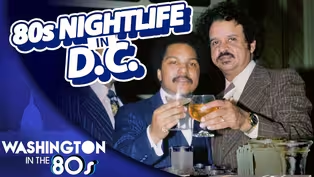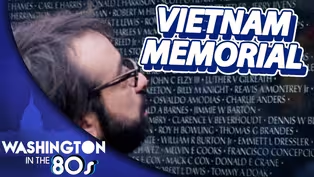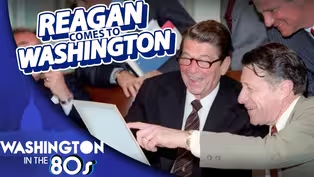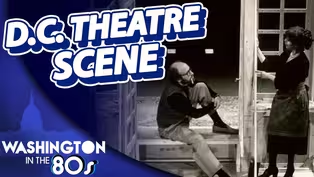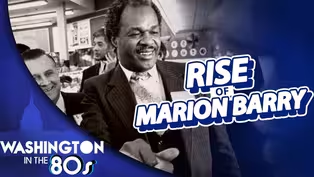
How Marion Barry Transformed Black Political Power in DC
Clip | 3m 15sVideo has Closed Captions
The election of 1982 represented an important milestone in the career of Marion Barry.
The election of 1982 represented an important milestone in the political journey of iconic DC Mayor Marion Barry and an important chapter in DC political history. As his first term drew to a close, voters had the opportunity to assess his performance since his election in 1978. Barry recognized the political need to shift his base to the Black community.
Problems playing video? | Closed Captioning Feedback
Problems playing video? | Closed Captioning Feedback
Washington in the 80s is a local public television program presented by WETA

How Marion Barry Transformed Black Political Power in DC
Clip | 3m 15sVideo has Closed Captions
The election of 1982 represented an important milestone in the political journey of iconic DC Mayor Marion Barry and an important chapter in DC political history. As his first term drew to a close, voters had the opportunity to assess his performance since his election in 1978. Barry recognized the political need to shift his base to the Black community.
Problems playing video? | Closed Captioning Feedback
How to Watch Washington in the 80s
Washington in the 80s is available to stream on pbs.org and the free PBS App, available on iPhone, Apple TV, Android TV, Android smartphones, Amazon Fire TV, Amazon Fire Tablet, Roku, Samsung Smart TV, and Vizio.
NARRATOR: By 1982, Mayor Barry's first term as mayor was coming to a close.
For the first time since his election in 1978, voters were given the chance to judge his record.
MILTON: He was elected by Whites, as he won essentially with the votes of people in wards one, two, three and six.
MAYOR BARRY: And this is just the beginning of what we're going to do here.
NARRATOR: But once in power, Barry knew that tying his political future to the city's white residents was unsustainable.
MILTON: He made an incredibly prudent political decision to switch his base to Black.
Through minority contracting programs and bringing Black folks into key positions in the government.
ISAAC: I can remember him saying, "Listen, you gonna be able to advance, you gotta get prepared for leadership."
And for somebody like me, I got to be Chief because of Barry.
NARRATOR: Barry used the power of his position to encourage the creation and development of African-American owned businesses.
ROBERT: And if you were gonna do business in DC, one of the first questions they'd ask you, "Do you have minority participation in this deal?"
What came about was sort of a... a philosophy that White businesses should partner up with qualified African-American business people.
And once you get a Black city council all of a sudden the White law firms start saying, "We're gonna have Black partners."
And some of the White businesses start saying, "We have to have Black lobbyists."
NARRATOR: The increased flow of money moving through the city's economy swelled the district's coffers, giving Barry the income to spend on projects that benefited the city's poorer youth, and build a base for the rest of his political career.
MAYOR BARRY: A most memorable program is the Summer Job Program.
Over 100,000 young people went through our Summer Job Program.
TOM: I was just at some event and the guy who was in charge of the people parking the cars came up to me and says, "I got my first job in the Marion Barry Summer Job Program."
And said, "Now, I help run this company."
KATO: That was the bomb.
You go down 500 C Street, and there's a long line of kids waiting in line to get their checks.
You know what I'm saying?
And you would see them all downtown at the Go Go at night, you know.
So that was awesome.
Yes indeed.
NARRATOR: Recognizing that the district's aging were underserved, Barry also invested heavily in services for the elderly.
TOM: And the flip side of that for Barry was in addition to that being a good thing was that he would take buses of... recreation buses and take them all down to vote.
NARRATOR: In 1982, Barry was elected to a second term as mayor, with 81% of the vote.
MAYOR BARRY: I want to thank all of you for reaffirming your faith in me.
NARRATOR: For more clips and to watch the full program visit weta.org/decades
Video has Closed Captions
Clip | 1m 41s | Discover the vibrant bar and club scene in Washington, DC during the mid-1980s. (1m 41s)
What Made Maya Lin's Vietnam Memorial Design Controversial
Video has Closed Captions
Clip | 2m 3s | Explore the story of the Washington, DC's Vietnam Memorial. (2m 3s)
How Washington DC Reacted to Ronald Reagan
Video has Closed Captions
Clip | 3m 19s | When Ronald Reagan came into office in 1981, Washingtonians reaction was mixed. (3m 19s)
How the DC Theatre Scene Exploded in the 1980s
Video has Closed Captions
Clip | 2m 54s | In the 1980s, Washington's alternative theater scene exploded. (2m 54s)
How Marion Barry Transformed Black Political Power in DC
Video has Closed Captions
Clip | 3m 15s | The election of 1982 represented an important milestone in the career of Marion Barry. (3m 15s)
Providing Support for PBS.org
Learn Moreabout PBS online sponsorshipSupport for PBS provided by:
Washington in the 80s is a local public television program presented by WETA
